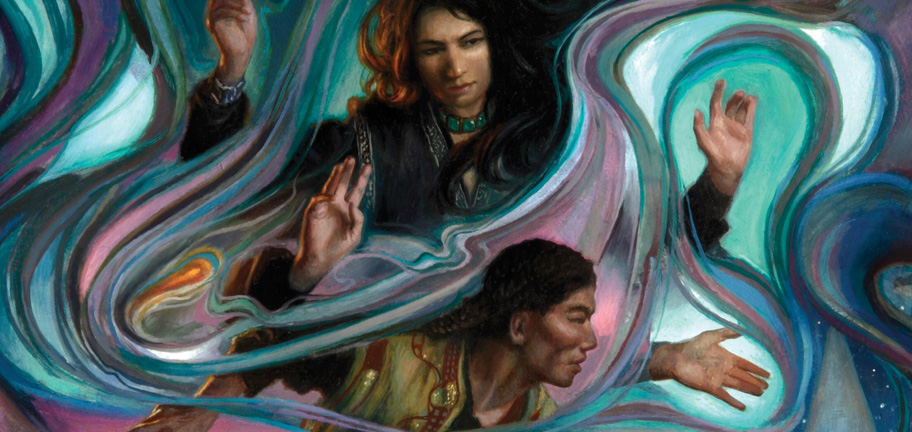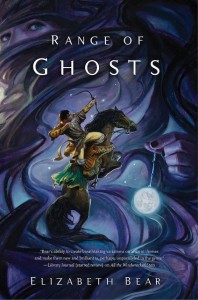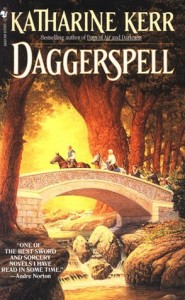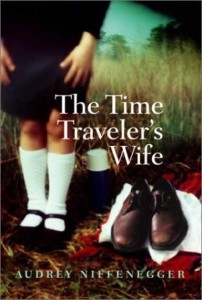Note: This article was originally published as part of Smugglivus, a year-end celebration of all things books over at The Book Smugglers. Check out the rest of the fun!
To begin the year, I set myself a challenge: read a perfect split balance of male:female authors in 2013. It was a personal challenge, and I asked no one else to follow along with me. This challenge had two purposes. The first was to provide more exposure for female fantasy and science fiction writers. The second was to expand my own tastes, to discover new authors. As 2013 winds down, I consider this challenge a success, but it wasn’t without some controversy.
In particular, the comments thread generated some salty discussion about my challenge and the idea of ‘quotas’ playing against the natural interests of a reader/critic. I read a lot of the same arguments, mostly about being ‘genderblind’, that I had once made. These arguments are so easy to fall back on, a safety net to avoid falling into blame. At first, I was quick to respond the same way, “I just read what I want to read, and ignore the gender of the author completely.” Well and true, maybe, but I started to recognize that, despite these excuses, there was a large bias (about one to three, female to male) in my reading habits. I began to ask myself why. I still don’t have an answer, but I did recognize that a conscious course correction was something I could be proactive about without needing an answer right away.
One of those commentors, prolific online reviewer Stefan Raets, also used that conversation as a jumping on point for analyzing and better understanding his reading habits. Recently, Stefan, along with Renay from Lady Business, was hosted in an open conversation by Liz Bourke on Tor.com, where he reflected on those original opinions, and what he’s learned since setting a similar challenge for himself: read and review only female authors for six months. It’s a fascinating conversation.
In addition, I realized a couple of years ago that the audience I had attained for my blog allowed me a position where I could make a positive impact on the genre (if only in a small way) by making positive impacts to my own habits. My Gender Balance in 2013 post has led to a very enriching experience as I have consciously attempted to correct my internal biases. I plan to continue to work towards parity every year.
You can see my progress towards my goals by visiting my Goodreads challenge.
As you can see, I might not hit my goal of 26 books this year, but I will, if everything goes as planned (Steles of the Sky by Elizabeth Bear, Raising Steam by Terry Pratchett, and The High Druid’s Blade by Terry Brooks) reach a perfect 50/50 split in male and female authors. It’s been a rewarding experience, and I’ve discovered some wonderful female authors that I had not reader before this year, including many of my favourite reads this year.
To celebrate this victory, I thought it would be nice to discuss three of the most enjoyable and important books by female authors that I read this year. I might not have discovered them if I had not taken the chance to evaluate my biases and work to correct them. And, well, I’m mighty glad I did.
My Favourite female-authored books of 2013
Range of Ghosts by Elizabeth Bear
Range of Ghosts, the first volume of Elizabeth Bear’s The Eternal Sky trilogy, is among the best fantasy novels published in the past decade. Big words, I know.
There’s adventure and great feats of magic in Range of Ghosts, equal to anything found in the ’80s hey-day of Epic Fantasy. Couple that with grand, sweeping worldbuilding that breathes life on every page, and you’ve a novel that will excite even the most jaded Fantasy fan. The characters of Range of Ghosts are subtle and achingly damaged. Temur and Samarkar, the novel’s two main protagonists, are caught in a war forced on them by the circumstance of their birth.
I think these successes come on the back of tremendous world-building and a respect towards myth, origin stories and storytelling’s importance at the way that culture, history and community affect and define the base presumptions and actions of various characters throughout those worlds. These are fictional places that, due to the respect given to the elements borrowed from our world’s own history, feel so grounded and concretely established that it often becomes difficult to tell the difference between the fiction and non-fiction. Bear is particularly good at pulling disparate elements from many cultures and societies (current and historical) and weaving them together in a dreamy otherworldliness that feels like it exists just on the other side of some innocuous curtain, waiting to be drawn aside by a curious hand.
Bear’s The Eternal Sky is among the best contemporary works the genre has to offer. Expansive without being bloated, intelligent and accessible, this is Fantasy at its best and will appeal to fans of authors ranging from Daniel Abraham and N.K. Jemisin, to Terry Brooks and Tad Williams. Range of Ghosts is wonderful and compelling, a truly great novel that moves the genre forward by challenging and embracing its history all at once.
For more thoughts, see my review of Range of Ghosts and Shattered Pillars. My review of Steles of the Sky, the final volume of the trilogy, will be published in the new year (spoiler: it’s also really damn good.)
Daggerspell by Katharine Kerr
In May of this year, alongside Kate Elliot (a great writer and person herself), I announced a Reread and Review of Katharine Kerr’s classic fantasy Daggerspell. I’d never read anything by Kerr, and Kate was a big fan (she initially turned me onto Kerr’s work), so the first volume of Kerr’s long-running Deverry series, Daggerspell seemed like a great jumping off point to discover her work. Discussing the book with Kate over the course of several weeks, my experience with Daggerspell turned out to be one of the highlights of the year for me.
In a time when I was feeling intense nostalgia for ’80s and ’90s fantasy, Daggerspell hit on a lot of the qualities that make that subgenre so endearing to me. Daggerspell is (to the best of my knowledge) unique to the rest of epic fantasy because of its unusual structure. Kerr “is untangling a much larger story,” Elliot said in the Reread and Review series, “one about the ways people harm and fail each other, which in the case of the Deverry books takes place over multiple lifetimes.” Instead of chapters, Daggerspell is split into several sections that take place, periodically, during different periods in history. Other fantasy series explore the idea of long-passed events rippling through centuries to affect the current story, notably George R.R. Martin’s A Song of Ice and Fire, but few, if any, that I’ve read tackle it so directly, and, the double-helix narrative is an enormous asset to the series, helping to set it apart from its contemporaries.
Brangwen, Lyssa and Jill, three reincarnations of the same soul, are so different from one another, at their core, but through the various life challenges they are handed, readers are exposed to different facets of their character, different strengths and weaknesses in response to external circumstances and challenges in their lives. These three women are so fascinating for how their decisions and struggles define the world (it’s culture, societal values, the choices of the powerful, etc…) that they live in. Examine these women, and you’ll learn much about the society.
Daggerspell is proof that fantasy can be epic and intensely personal all at once, that strong female characters don’t have to wield a sword, and that modern fantasy still has so much it can learn from some of its classic series (that weren’t written by Tolkien, Jordan or Martin.)
- The Daggerspell Reread and Review Series Intro
- The Daggerspell Reread and Review Series: Part One
- The Daggerspell Reread and Review Series: Part Two
- The Daggerspell Reread and Review Series: Wrap-up
The Time Traveler’s Wife by Audrey Niffenegger
Niffenegger’s classic story has sold millions of copies since it was first published in 2003. It likely needs no introduction. This contemporary classic is generally found in the Capital-L Literature section of most bookstores, but it’s undeniably a work of science fiction that transcends the traditional bounds of the genre. It’s a romance and a tragedy, a comedy and a philosophical think tank. It’s everything a good novel should be, and when I turned the final page, I left a part of my heart behind with those characters. I still think about them nearly daily, months later.
Niffenegger once wrote about art, its purpose and genesis. “If art were simply a response to pain, there would be a lot more art,” she said.” The Time Traveler’s Wife is, at times, a novel full of pain and despair, but it is also a novel ripe with affection and those small moments of healing and laughter that fill every day.
“I think that art is the result of inquisitiveness, mingled with a deep desire to make things be,” she continued. “In 1997 I was sitting at my drawing table when a phrase popped into my head: the time traveler’s wife. I wrote it down on the sheet of Kraft paper that covered the table, along with all the other ideas and song titles and lists of Things to Do. It was a generous phrase. It assured me that there were two characters, a husband and a wife, and that the husband was a time traveler. I started to think about the wife. It would be hard to be the wife, I thought; you’d spend a lot of time waiting for your man, and he would be the one having all the adventures. I felt sorry for her; I could see her, sitting at a table, drinking tea, waiting. Why does he leave her alone? I wondered. Another idea plopped down: time travel is a disease, it’s a genetic disorder. By now this little cluster of ideas had my full attention. I wasn’t interested in anything else now, and I began to build and ponder and worry them into being. Their names are Clare and Henry. She has red hair. His mother died in a car crash. He visits Clare when she’s a child. She makes art about birds. My curiosity was riveted: I had to find out the story, and to find out, I wrote.”
Like the characters that first revealed themselves to Niffenegger at her drawing table, The Time Traveler’s Wife grabs hold and refuses to let go. I remember when my wife first finished The Time Traveler’s Wife. We were stranded in a small Slovakian town, without a bus in sight for at least a couple of days, with nothing to do but eat and read. Every night, my wife would stay up late, reading by lamplight well after I’d drifted off. Then, the second or third night we were there, she finished the novel. Tears wet her cheeks. I asked her why, asked her if the end of the book was sad, or scary? She tried, but couldn’t articulate just why she was crying, but her intense emotional connection to the novel was clear. I knew then that I’d read the book someday. It took almost five years until I finally did. That moment has stayed with me ever since, but it was only on completing Niffenegger’s novel that I finally understood her reaction to the book. It’s an astoundingly gorgeous, tragic, and heartbreakingly sweet book.





[…] attempting to catch up with my blog reading over the holiday break, I noticed I missed a great post at Dribble of Ink. At the link, author Aidan Moher discusses his 2013 plan for reading an equal […]
I read Time Traveler’s Wife several years ago and was so impressed by it. Like your wife I finished the book in tears. In fact I think I began crying about 50 pages from the end and never stopped. It is a beautiful, engaging and emotional read.
I was very pleased with several first-time-for-me author experiences as part of World Without End’s “Women of Genre Fiction Challenge”, including Karen Lord, C.S. Friedman, Cassandra Rose Clarke, Martha Wells, Mary Robinette Kowal and several others through short stories on Tor.com and in Lightspeed, Asimov’s and Clarkesworld.